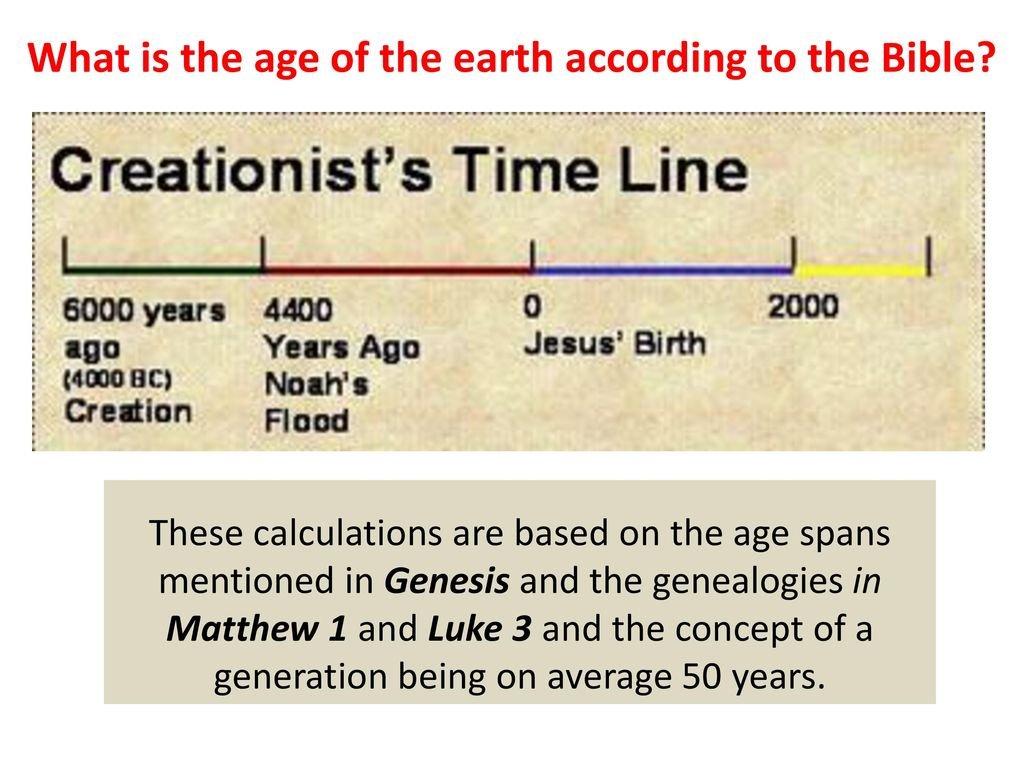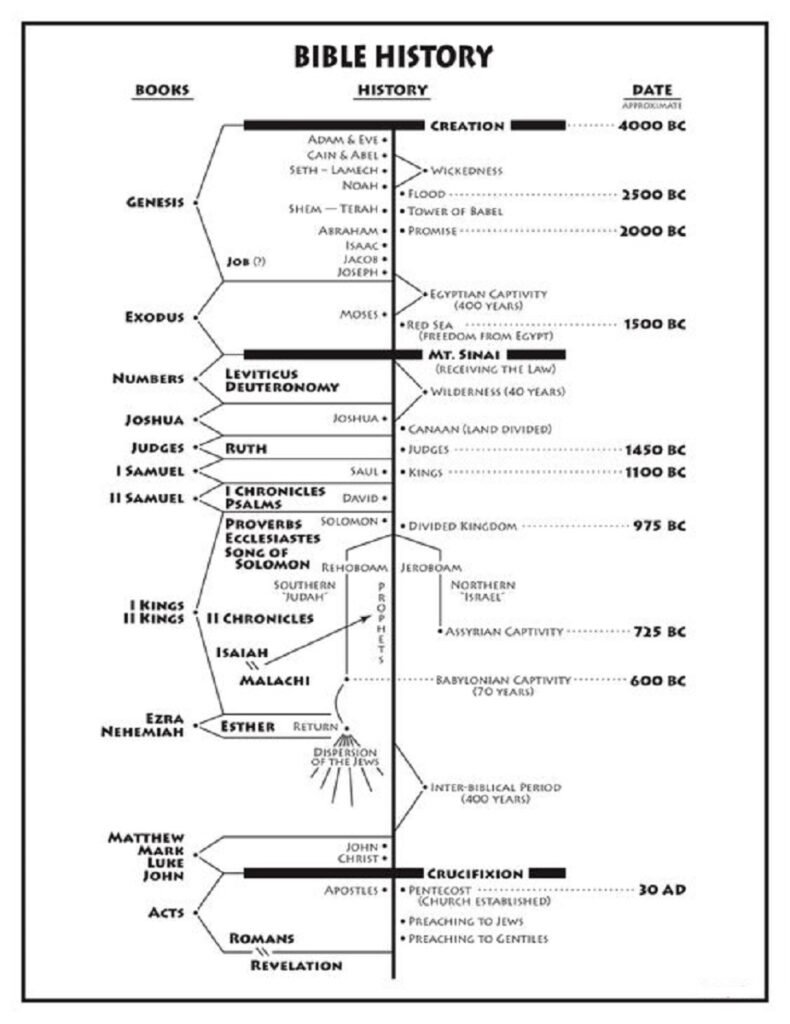𝐂𝐡𝐫𝐢𝐬𝐭𝐢𝐚𝐧𝐬 𝐚𝐧𝐝 𝐭𝐡𝐞 𝐚𝐠𝐞 𝐨𝐟 𝐭𝐡𝐞 𝐄𝐚𝐫𝐭𝐡 𝐚𝐜𝐜𝐨𝐫𝐝𝐢𝐧𝐠 𝐭𝐨 𝐭𝐡𝐞 𝐁𝐢𝐛𝐥𝐞.
Mohamad Mostafa Nassar
Twitter@NassarMohamadMR

These calculations are based on the age spans mentioned in Genesis and the genealogies in Matthew 1 and Luke 3 and the concept of a generation being on average 50 years.
It is recommended to have a read on these following supporting links from the Bible itself and this group Young Earth Creationsim also confirms this Biblical error.
Genesis 1-11
Biblical History of Earth according to the Bible.
One of the main criticisms made against Muslims is that we take the Bible too literally (when criticising it). I think this is a fair criticism from non-Christians. To understand religion as it is practised, one needs a more nuanced view than simply “This is what the Bible says”. Religion as a social phenomenon is much more complex than that.
But what annoys me is Christians who say that they believe the Bible, but then ignore most of it. When we point out horrors in the Bible (like how it orders genocide, and suggests that raping your un-engaged female slaves is OK, or orders the death penalty for apostasy), Christians argue that that isn’t meant to be taken literally.
That’s fine, but if you’re going to tell me how something isn’t meant to be taken, you also have to tell me how it is meant to be taken! And not just a general “that’s meant to show us how things were before Jesus came” answer.
Anyway, one thing that annoys me is Christians who pretend to believe the Bible, but tell me that it doesn’t say that the world is only 6000 years old. Invariably this is because they latch onto that “days” in Genesis doesn’t necessarily mean a literal 24 hour period, and that “son of” in the Bible doesn’t necessarily mean the literal son, maybe just a descendant.
They talk about this with such vehemence as if they’ve never noticed that we use the words in that way today, without any confusion (e.g. “you can’t stop children of the revolution”, or “back in my day” or “in the days before computers…”)
So I cracked it with one of those Christian comments and went through and calculated from the Bible – using only verses that defy “non-literal” interpretation – how old the Bible thinks the earth is – or at least how long it thinks it is from Adam to today. And lo and behold, I came up with a number that’s fairly similar to Bishop Ussher’s.
My point is to show that Ussher wasn’t some crackpot who pulled numbers out of his arse, but that this really is what the Bible says, and Christians who say otherwise are lying to you.
Since I only wrote it in a comment which will probably get deleted, I thought I had better copy and paste it to somewhere more permanent. Here’s what I wrote, with some of the introduction removed. Apologies to anybody who’s already seen it:

Here, let us do the math for you
Read this: Bible Gateway passage: Genesis 5 – New Revised Standard Version
Here’s the Biblical timeline:
Creation, year 0
+130 years: Seth born
+105 years: Enosh born
+ 90 years: Kenan born
+ 70 years: Mahalalel born
+ 65 years: Jared born
+162 years: Enoch born
+ 65 years: Methuselah born
+187 years: Lamech born
+182 years: Noah born
+600 years: Flood ( Genesis 7:6 )
So if you do the maths that adds up to 1656 years from creation to the beginning of Noah’s flood (give or take maybe 10 years for rounding).
Now go to Genesis 11
+ 2 years: Arphaxad born (plus maybe another year for the flood)
+ 35 years: Shelah born
+ 30 years: Eber born
+ 34 years: Peleg born
+ 30 years: Reu born
+ 32 years: Serug born
+ 30 years: Nahor born
+ 29 years: Terah born
+ 70 years: Abraham (“Abram”) born
==========
years from Noah’s flood to Abraham’s birth: 292
Total years from creation to Abraham’s birth: 1656+292=1948 (again, maybe add one for the flood, and give or take ten or so for rounding, but still, well under 2000!)
By now of course we’re well into historical times. Abraham came from Chaldaea, a civilisation we know flourished about 3000 years ago. But you could say that this was before the civilisation became large.
Anyway, the Bible tells us a few more dates after that:
+100 years: Birth of Isaac (Genesis 21:5)
+ 60 years: Birth of Jacob (Genesis 25:26)
+130 years: Jacob’s family move to Egypt (Genesis 47:28)
+400 years: Exodus (Genesis 15:13; Acts 7:6) or 430 years: (Exodus 12:40-41; Galatians 3:16-17)
+480 years: Construction of First Temple ( 1 Kings 6:1)
===========
years from Abraham’s birth to the beginning of the First Temple construction: 1170 or 1200 years
Total years from creation to the beginning of the First Temple construction: 1948+1170=3118 years, or 1948+1200=3148 years.
Since we’re worrying about millions of years, and there would be some rounding errors anyway, let’s make it a nice even 3150 years (and say it could be anything between 3100-3200 years).
We’re now clearly in historical times, so this should rule out the “millions of years” idea already. Note that I’ve only used Bible verses which clearly are “meant to be taken literally” and I haven’t taken them out of context. If you can give me a non-literal reading of any of those verses I’d be most interested.
The Biblical timeline from Solomon’s Temple (or even from David, his father) to Jesus is less clear. Obviously from the contradictory genealogies in Matthew 1:1-17 or Luke 3:23-38 give us an idea that it’s in the centuries, rather than millions of years. Matthew helpfully tells us it’s 28 generations, or with their weird counting, 26, which still if you average 30 years per generation, is less than 800 years (3150+800+2020=5970).
But I think we can do better. We can trace the Kings of Judah:
40-4=36 years from the beginning of the building of the temple to Solomon’s death (1 Kings 11:42)
+ 17 years: reign of Rehoboam (1 Kings 14:21) (this is when the kingdom split, you might be able to trace a similar lineage through the northern kingdom)
+ 3 years: reign of Abijah (2 Chronicles 12:16, 2 Chronicles 13:1, 2 Chronicles 13:2)
+ 41 years: reign of Asa (1 Kings 15:9-10)
+ 25 years: reign of Jehosaphat (1 Kings 22:41-42)
+ 8 years: reign of Jehoram (2 Kings 8:17)
+ 1 year: reign of Ahaziah (2 Kings 8:26 cf 2 Chronicles 22:2)
+ ? 6 years: reign of Ahtaliah (2 Chronicles 22:10-12)
+ 40 years: reign of Jehoash (2 Kings 12:1; 2 Chronicles 24:1)
+ 29 years: reign of Amaziah (2 Kings 14:1-2)
+ 52 years: reign of Uzziah (2 Chronicles 26:1-3)
+ 16 years: reign of Jotham (2 Kings 15:32-33)
+ 16 years: reign of Ahaz (2 Kings 16:1-2 )
+ 29 years: reign of Hezekiah (2 Kings 18:1-2)
+ 55 years: reign of Manasseh (2 Kings 21:1)
+ 2 years: reign of Amon (2 Kings 21:18-19)
+ 31 years: reign of Josiah (2 Kings 22:1)
+ 0 years 3 months: reign of Jehoahaz ( 2 Kings 23:31 )
+ 11 years: reign of Jehoiakim (2 Kings 23:36)
+ 0 years 3 months: reign of Jeconiah/Jehoiachin (2 Kings 24:6-8)
+ 11 years: reign of Zedekiah (until the Babylonian exile): (2 Kings 25:1-21)
=========
years from the construction of the first temple until its destruction (the Babylonian exile) : 430 years
Total years from creation to the destruction of the second temple: 3150+430=3580 years
From history we know that this occurred in 586 or 587 BC (Kings of Judah) If you don’t believe history, Matthew 1 tells us it was 13 generations, which if anything should make it even shorter.
So that would put creation at 3580+587+2016=6183 years ago.
In case you didn’t see it: ***** 6183 years bp *****
You can get a century or two leeway there because of rounding errors, and some differences between how Hebrews count compared to how we do (e.g. counting 0), and one of two small ambiguities. I’d bow to Ussher’s superior Bible knowledge there. But there’s no way you can stretch it out for millions of years.
Please note a few things:
- none of that calculation relied on guessing how long a generation was.
- none of them relied on generations at all, so you can’t use the “father can mean grandfather” argument. Where it’s counting from father to son, it’s counting the age it tells us that the father was when the son was born (so it doesn’t matter if the “father” was really the “grandfather). When counting the reign of Kings, it doesn’t matter if they are father and son or not!
- obviously if, like me, you don’t believe the Bible, you can just ignore all this. But if you say you believe the Bible, you can’t just say “it’s not meant to be taken literally”. Almost all of these passages were pretty clear, for example: “When Kenan had lived seventy years, he became the father of Mahalalel.”
So the only conclusion is that the Bible is simply wrong somewhere along the line (probably in the early years, such as creation) or that the first person was created about 6200 years ago.
Of course, you can go back before that and say that the world was older than that, but the first human was only created 6200 years ago. That’s an extraordinary enough claim, given the diversity in genetics, language, culture, etc., but not as extraordinary as the idea that the Chaldean civilization flourished less than 200 years after the whole earth was destroyed by a global flood, leaving only one family alive.
Allah Knows Best.
References:
False Reports about the Earth Being Placed on the Back of a Bull or a Whale
Christian prince got busted while criticizing quran for the same thing he has in the bible
Difference between the Quran and Bible Teaching about the shape of the Earth
Do the Quran and Bible Teach That the Earth Is Flat?
Consensus that the Earth is round
Does the Qur’an say the earth is flat? Islamic scholarship & the multiplicity of readings approach